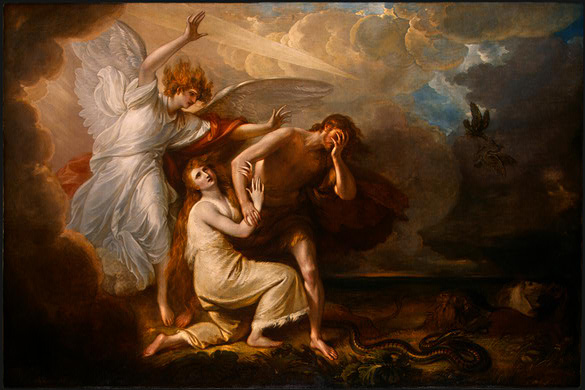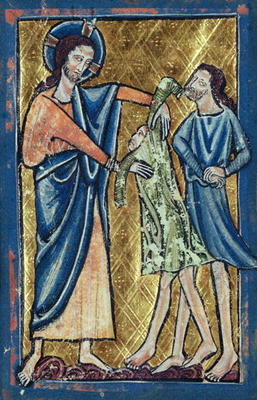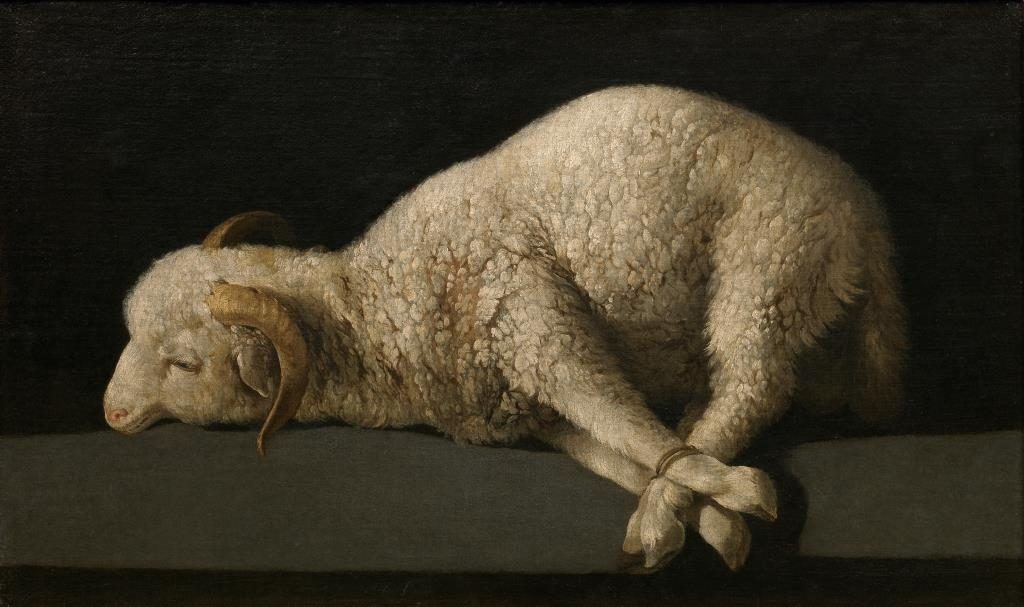Dear Brothers and Sisters,

It’s a common misconception to think that Adam and Eve’s expulsion from the Garden of Eden was God’s way of punishing the first man and woman for disobeying his instructions. In line with that wrong notion, artists (as in the picture below) typically portray the expulsion scene with an angel, serving as God’s agent of wrath, rather violently ejecting Adam and Eve from the Garden of Eden (Paradise) and then preventing their return.
Along with this misconception comes another, namely that when Adam and Eve sinned, God had to come up with “Plan B” to replace his original plan that mankind would not sin and thus live “happily ever after” with him in Paradise.

(public domain via Wikimedia Commons)

(public domain)
But then there’s the truth conveyed in the Genesis narrative where the God of grace, continuing to implement his one and only plan, is shown extending his loving care to Adam and Eve—both within the Garden, and then outside. Having judged as being inadequate the fig-leaf coverings with which the couple had clothed themselves (Genesis 3:7), God (as shown in the painting at right) clothed Adam and Eve with garments he made of the hides of animals (Genesis 3:21). Only then did God usher the couple out of Paradise. Thus their expulsion should be understood as protection, not punishment. Note this:
Then the Lord God said, “Behold, the man has become like one of Us, knowing good and evil; and now, he might stretch out his hand, and take also from the tree of life, and eat, and live forever”—therefore the Lord God sent him out from the garden of Eden, to cultivate the ground from which he was taken. (Genesis 3:22-23 NASB)
Because his love for Adam and Eve (and all humanity with them) was so great, God did not want them to eat the fruit of the tree of life and thus live in their fallen condition forever. God always was, and still is, for his beloved.
I find it just a bit humorous that some, despite knowing God to be Creator of all things and all-knowing, nevertheless believe he was caught off guard by the events in the Garden of Eden. Perhaps they see God, resting after creation, and proud of all he had accomplished, being startled when an angel approaches and declares, “We have a problem!” But the omniscient Creator was not surprised by Adam and Eve’s disobedience. He did not have to “punt” and move to a hastily-devised plan B. God foreknew what Adam and Eve (representing humankind) would do and, to use a modern cliché, “had it covered.”
The death of the animals, whose skins provided Adam and Eve’s covering, is seen by many as foreshadowing the death of the ultimate sacrifice for covering the sins of all humanity. That sacrifice, of course, is Jesus Christ, the Lamb of God (John 1:29; Revelation 13:8).

From before the foundation of the world (1 Peter 1:20 ESV), God’s plan included what he would do to restore humanity to fellowship with God (pictured by the Garden of Eden). God’s clothing of Adam and Eve with animal skins pointed forward to Israel’s animal sacrifices that, in turn, pointed to the sacrifice of Jesus, the second (final) Adam, who “covered” the sins of the world by sacrificing himself. Thus we understand that Incarnation and Atonement were part of God’s plan from the beginning.
God’s plan of redemption was not Plan B—it was the only plan, because it was a perfect plan—coming directly from the heart of our Triune God. Though death is the consequence for disobeying God (Romans 6:23), God did not leave us in the state of death. He rescued us by giving, as a gift of sacrifice, his only Son for the sake of bringing life out of death.
Prior to man’s first breath, the Son of God chose to become the Son of Man to save us from the sin that easily ensnares us, bringing horrific consequences, death included. The father of lies whispered into Adam and Eve’s ears the idea that they must go their own way—shape their own identity. The deceiver continues to spread the same false idea today. He does so, in large part, by convincing us that we are unlovable and thus unloved—not worthy to be God’s children because we are “not”—not good enough, not talented enough, not even skinny enough; and, therefore, we must find our own way.
Understanding Satan’s tactics, we can understand that Adam and Eve suffered from the first case of a stolen identity. Rather than believing the truth that they were God’s masterpiece—his beloved children—they believed the lie that they could not count on God and must make something of themselves. Not trusting God, they disobeyed, declaring that they would be whom they decided to be, and would not depend on anyone or anything to do so. As a result, Adam and Eve (and humankind along with them) became a false version of who God made us to be—his image! But because of his love for us, God would not allow Adam and Eve to enter into eternity bearing a false image. So in love, he removed them from Paradise and thus from access to the tree of life. Doing so was always part of God’s plan that, ultimately, would come to fullness in Jesus Christ.
God says we are “fearfully and wonderfully made” and “precious in his sight.” He calls us all to be his children and heirs to his promise. He tells us that we are unconditionally loved, and he proved that by dying for us while we were still sinners. God, in Christ, became the Lamb slain prior to the foundation of the world—prior to the fall—because he knew humanity would try to do things its own way before realizing the value of doing things his way.
God’s plan for us has always been to give us eternal life as his glorified sons and daughters. So, prior to the first sin, God set his plan (his only plan) in motion. That plan was and is to restore us to the image and identity he intended for all of us from the beginning. Before we sinned and believed ourselves to be unloved, and God to be untrustworthy, God’s plan for salvation clearly demonstrated his love and grace towards us all. As a result, God was much more interested in protecting Adam and Eve than in punishing them. That’s the type of God we serve and are called to share with others. He is a God who, in Christ, has proved himself willing to do anything for us. He is a God who sees us according to our true identity—his children, created in his image.
Rejoicing in the true identity that is ours in Christ,
Joseph Tkach



What a wonderful thing it is to know the truth! Thank you Father, Jesus, and Holy Spirit.
If we take this story literally we are still faced with God’s cursing the ground which will now “bring forth thorns and thistles” [every farmer’s nightmare]. As far as I can tell, the earth did nothing to deserve cursing. Eve is promised pain in childbearing and “your husband shall rule over you.” And the dumb serpent, used by the Tempter is forced to slither on the cursed ground from then on, scaring anyone who happens to come close. Obviously there are many layers of meaning in this story, the literal being but one. But it still needs to be addressed. Thanks.
Joe,
Thanks much for your contribution and for offering a very important perspective. Issues evolving around “original sin” have over centuries been a focal point of discussion within the larger Christian family. Thought that readers might also find the article below to be of interest
https://shar.es/1wOrOE
For a more detailed exposition of the “original sin” question the following thought provoking resources may offer some insights (not to be understood as a personal endorsement of any particular views).
– “Adam, The Fall, and Original Sin” (edited by Hans Madueme and Michael Reeves)
-“The Story Of Original Sin” by John E. Toews
– “Sin” by Paula Fredriksen
God for us, in us and through us.
While I agree with your analysis, the Genesis account remains problematical. We view Genesis from the modern perspective that God is omniscient and that he does not live in spacetime but created spacetime. Though our minds become filled with paradoxes when we consider it, God knew what would happen with Adam and Eve in the garden because YHWH is not bound within time.
But the Genesis account describes YHWH as if he were an ancient Middle Eastern tribal god. He has many human characteristics in the account, including not knowing that Adam and Eve had eaten of the forbidden tree until he asked them.
If anything the tension between what we believe about God and what the author of Genesis believed about God should inform us that the Bible must be read with attention to both history and culture, ancient and modern. Is the meaning on the surface or is it layered underneath allegory? Is the snake literal or symbolic of something else?
Genesis is a point where many these questions and controversies condense. No wonder it has been excessively interpreted.
Interestingly enough, we see the same care for Cain even after he murdered his brother Abel. Thank you Dr. Tkach!
Hi Joe;Thanks for clearing up plan “B” for me because I believed that Jesus was just that,plan “B”.Keep these articles coming.I need them lots.